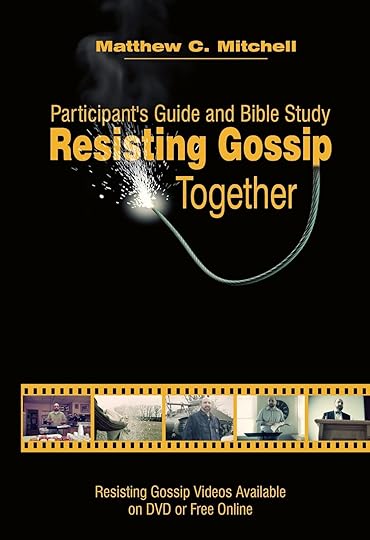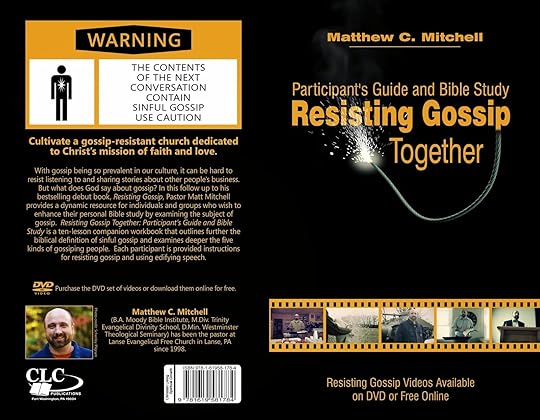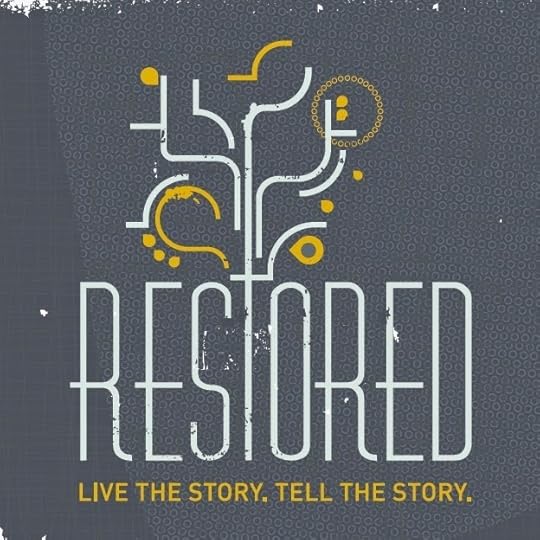Matthew C. Mitchell's Blog, page 117
July 20, 2014
[Matt's Messages] "Worthy of Praise"
 “Worthy of Praise”
“Worthy of Praise”The LORD Is My Rock: The Message of 2 Samuel
July 20, 2014 :: 2 Samuel 21:1-22:51
We’ve reached the end of 2 Samuel after nearly a year of working through both 1st and 2nd Samuel together. We’ve reached the part at the end of 2 Samuel that really seems out of place. Some scholars call it an “epilogue.” Some call it an “appendix.”
The reason is because the stuff we’re going to read in chapters 21 through 24 are not chronological. They don’t carry on the story of David, they go back and fill in the gaps of the picture of what we’ve already read.
But they aren’t just a bunch of tacked-on items, either. There is a lot of evidence that this is a carefully constructed section of 2 Samuel and not just some unnecessary appendix.
These chapters are God’s Word, as well, and we will give them our attention together.
Today, I want to look at chapters 21 and 22.
And mostly chapter 22 under the title, “Worthy of Praise.”
But first we need to look at the sad and strange stories of chapter 21 before we get there.
The title of this message is “Worthy of Praise” from chapter 22, verse 4. For many of us, a very familiar verse, “I call to the LORD, who is worthy of praise, and I am saved from my enemies.”
That was David’s experience. He was saved from His enemies by the LORD, and He gave praise to God.
In chapter 21, the first enemy we encounter is a severe famine. Chapter 21, verse 1.
“During the reign of David, there was a famine for three successive years; so David sought the face of the LORD.”
That would be a true enemy–a famine that lasted for 3 successive years. That would threaten the continuing existence of Israel.
And David could tell that this was a problem that had to be addressed through prayer.
We don’t know exactly when this happened, it was probably after David had shown hesed to Mephibosheth (chapter 9), but we do know that David sought the face of the LORD. And God answered.
“The LORD said, ‘It is on account of Saul and his blood-stained house; it is because he put the Gibeonites to death.’ [Do you remember the Gibeonites? They were introduced back in Joshua chapter 9.]
The king summoned the Gibeonites and spoke to them. (Now the Gibeonites were not a part of Israel but were survivors of the Amorites; the Israelites had sworn to spare them, but Saul in his zeal for Israel and Judah had tried to annihilate them.)
[Saul had broken his covenant. Broken Israel’s solemn promises in the name of the LORD. There must be some restitution. V3.]
David asked the Gibeonites, ‘What shall I do for you? How shall I make amends [literally: atonement] so that you will bless the LORD's inheritance?’
[And they ask for something huge and hard.]
The Gibeonites answered him, ‘We have no right to demand silver or gold from Saul or his family, nor do we have the right to put anyone in Israel to death.’ [Our courts don’t have that power even though it would be justice.]
‘What do you want me to do for you?’ David asked. They answered the king, ‘As for the man who destroyed us and plotted against us so that we have been decimated and have no place anywhere in Israel, let seven of his male descendants be given to us to be killed and exposed before the LORD at Gibeah of Saul–the Lord's chosen one.’ So the king said, ‘I will give them to you.’
The king spared Mephibosheth son of Jonathan, the son of Saul, because of the oath before the LORD between David and Jonathan son of Saul. [David is a king who does keep his promises, unlike Saul!]
But the king took Armoni and Mephibosheth, the two sons of Aiah's daughter Rizpah, whom she had borne to Saul, together with the five sons of Saul's daughter Merab, whom she had borne to Adriel son of Barzillai the Meholathite.
He handed them over to the Gibeonites, who killed and exposed them on a hill before the LORD. All seven of them fell together; they were put to death during the first days of the harvest, just as the barley harvest was beginning.”
Now, I’ll just say that I struggle to accept this.
Every indication in the text is that this is both legal and just. In a minute, we’ll see that after this God brings the rain.
But what a terrible cost to be inflicted on these men because of their grandfather’s sin.
But true justice and atonement is not a pretty thing. It involves blood and death.
So we don’t explain this away or turn away our eyes. This is terrible.
And so is sin. Saul broke covenant. In his zeal for Israel and Judah, he forgot what should have been his zeal for the LORD. And he tried to exterminate the Gibbeonites.
And these men paid for it with their lives.
It’s profoundly sad, and it should remind us of the Cross.
When one man died a bloody, painful death to make atonement for our sins. Gruesome but real.
And real sad. V.10
“Rizpah daughter of Aiah took sackcloth and spread it out for herself on a rock. From the beginning of the harvest till the rain poured down from the heavens on the bodies [could we weeks?], she did not let the birds of the air touch them by day or the wild animals by night. [What a picture of motherly love!]
When David was told what Aiah's daughter Rizpah, Saul's concubine, had done, he went and took the bones of Saul and his son Jonathan from the citizens of Jabesh Gilead. (They had taken them secretly from the public square at Beth Shan, where the Philistines had hung them after they struck Saul down on Gilboa.)
David brought the bones of Saul and his son Jonathan from there, and the bones of those who had been killed and exposed were gathered up. They buried the bones of Saul and his son Jonathan in the tomb of Saul's father Kish, at Zela in Benjamin, and did everything the king commanded. After that, God answered prayer in behalf of the land.”
Saved from the enemy of famine.
Now, some other kinds of enemies. Some real bad dudes who belonged the family of Rapha who was apparently gigantic. V.15
“Once again there was a battle between the Philistines and Israel. David went down with his men to fight against the Philistines, and he became exhausted. And Ishbi-Benob, one of the descendants of Rapha, whose bronze spearhead weighed three hundred shekels and who was armed with a new sword, said he would kill David.”
Do you get the picture?
This is earlier in David’s reign. He’s fighting the Philistines and he had so many times. But this time, he’s gotten exhausted, and this really bad dude named Ishbi-Benob sees David and goes for the kill. He grabs his heavy spear and a new weapon, and threatens David and comes rushing at him in the battle.
It’s like a movie, right? It looks like it’s all over for King David. V.17
“But Abishai son of Zeruiah came to David's rescue; he struck the Philistine down and killed him. Then David's men swore to him, saying, ‘Never again will you go out with us to battle, so that the lamp of Israel will not be extinguished.’”
David was too valuable to go down like that. V.18
“In the course of time, there was another battle with the Philistines, at Gob. At that time Sibbecai the Hushathite killed Saph, one of the descendants of Rapha.
In another battle with the Philistines at Gob, Elhanan son of Jaare-Oregim the Bethlehemite killed Goliath the Gittite [another Goliath the Gittite–probably named after the one whom David had killed], who had a spear with a shaft like a weaver's rod.
In still another battle, which took place at Gath, there was a huge man with six fingers on each hand and six toes on each foot–twenty-four in all. He also was descended from Rapha. When he taunted Israel, Jonathan son of Shimeah, David's brother, killed him. These four [bad guys] were descendants of Rapha in Gath, and they fell at the hands of David and his men.”
Now, there are probably several points to this section, some of which I don’t understand yet, but the basic point is that God consistently rescued and gave victory to David and his men.
And David knew that. That’s why he wrote chapter 22.
It’s basically a psalm. In fact, it became a psalm. Most of chapter 22 of 2 Samuel also appears in the 18th Psalm!
And here’s the point of chapter 22. The LORD is worthy of praise because He has saved David over and over again.
Worthy of Praise.
Let’s look at verse 1.
“David sang to the LORD the words of this song when the LORD delivered him from the hand of all his enemies and from the hand of Saul.
[David wrote this after his kingdom had been established.]
He said: ‘The LORD is my rock, my fortress and my deliverer; my God is my rock, in whom I take refuge, my shield and the horn of my salvation. He is my stronghold, my refuge and my savior–from violent men you save me. I call to the LORD, who is worthy of praise, and I am saved from my enemies.”
Are those familiar words?
This is a great song!
David lets loose with praise in this song.
He is so intent on giving God the glory that He deserves. He pulls out all of the stops.
“I call to the LORD, who is worthy of praise, and I am saved from my enemies.”
Point #1 this morning.
The LORD is worthy of praise.
#1. BECAUSE HE SAVED ME.
I love all of the words that David piles onto each other to get across His praise of God. V.2 again.
‘The LORD is my rock, my fortress and my deliverer; my God is my rock, in whom I take refuge, my shield and the horn of my salvation. He is my stronghold, my refuge and my savior...”
This is the verse from which we got the title of this entire sermon series.
“The LORD is my rock.”
He is so unchanging, so strong, so safe.
He’s a rock. And not just any rock–MY rock. Did you see “my” in there?
That’s a relationship word.
‘The LORD is my rock, my fortress and my deliverer; my God is my rock, in whom I take refuge, my shield and the horn of my salvation. He is my stronghold, my refuge and my savior.”
He’s not saying that the LORD isn’t other people’s rock, as well. He’s just exuberantly delighting in the fact that he belongs to Him.
There is a great example here of delighting in our relationship with the Lord.
And at the bottom of it, David says that the LORD is worthy of his praise because He saved David again and again and again.
In verse 5 he tells the story. Now, just so you know, this is poetry. He’s going to go off the charts with his language. You aren’t supposed to take this literally, but everything he says is true when you get it. V.5
“‘The waves of death swirled about me; the torrents of destruction overwhelmed me. The cords of the grave coiled around me; the snares of death confronted me.
[That’s every time that David was in trouble. And David has lived a life in trouble. But not alone. Chased but not caught. And he cried out to God again and again. V.7]
In my distress I called to the LORD; I called out to my God. From his temple he heard my voice; my cry came to his ears. The earth trembled and quaked, the foundations of the heavens shook; they trembled because he was angry. [Who is troubling my son?]
Smoke rose from his nostrils; consuming fire came from his mouth, burning coals blazed out of it. He parted the heavens and came down; dark clouds were under his feet. He mounted the cherubim and flew; he soared on the wings of the wind. He made darkness his canopy around him–the dark rain clouds of the sky.
Out of the brightness of his presence bolts of lightning blazed forth. The LORD thundered from heaven; the voice of the Most High resounded. He shot arrows and scattered the enemies, bolts of lightning and routed them. The valleys of the sea were exposed and the foundations of the earth laid bare at the rebuke of the LORD, at the blast of breath from his nostrils. He reached down from on high and took hold of me; he drew me out of deep waters. He rescued me from my powerful enemy, from my foes, who were too strong for me. They confronted me in the day of my disaster, but the LORD was my support.”
Now, again, this is poetry. He’s not saying that God literally pulled back the curtains of heaven and dropped out and started attacking David’s enemies while riding an angel.
But David is saying that God rescued him. God saved him again and again. And He did it powerfully. Mysteriously. Dreadfully. He is someone to fear.
David’s foes were too strong for him, but not too strong for David’s God.
He rescued me from my powerful enemy, from my foes, who were too strong for me. They confronted me in the day of my disaster, but the LORD was my support.”
“I call to the LORD, who is worthy of praise, and I am saved from my enemies.”
Who are your enemies? And has the LORD saved you from them?
The world, the flesh, and the devil are our enemies.
The external, internal, and infernal enemies.
And if you have called upon the LORD for salvation through Jesus Christ, He has saved you from your enemies. He has saved me from my enemies.
He is worthy of praise! Amen?
Here’s the application of #1.
- NEVER STOP SINGING ABOUT YOUR RESCUE.
The biggest take home I have for this whole chapter is that David wrote a song.
And he filled it full of the most exuberant, boisterous, high-spirited, extravagant, profuse, ebullient praise to the God who had saved Him.
How much more should you and I praise God all the time for our rescue?
Never stop singing about your rescue.
Those of us who went to Challenge still have the songs from Challenge ringing in our minds, and they were good songs to have in your mind!
One song said:
We are more than conquerors, through Christ
You have overcome this world, this life
We will not bow to sin or to shame
We are defiant in Your name
You are the fire that cannot be tamed
You are the power in our veins
Our Lord, our God, our Conqueror
Never stop singing about your rescue. Don’t let it get old.
Salvation is worth singing about.
Now, the second reason this song gives for why God is worthy of praise will probably surprise you.
#2. BECAUSE HE DELIGHTED IN ME.
God is worthy of praise because He delighted in me. V.20
“He brought me out into a spacious place; he rescued me because he delighted in me. ‘The LORD has dealt with me according to my righteousness; according to the cleanness of my hands he has rewarded me. For I have kept the ways of the LORD; I have not done evil by turning from my God. All his laws are before me; I have not turned away from his decrees. I have been blameless before him and have kept myself from sin. The LORD has rewarded me according to my righteousness, according to my cleanness in his sight.”
Now, wait just one second!
Who wrote this? King David.
And he says that he is blameless? That he has not done evil? That he has never turned away from God’s decrees?
And that God is rewarding Him with blessings that correspond to David’s righteousness?
David? Of David and Bathsheba? Of David and Uriah? That David?
Yes, that David.
God is worthy of praise because He rescued David because He delighted in David.
Now, David is not claiming to be sinless. Blameless is not sinless.
David is not claiming to be perfect.
David is claiming to love God.
David is claiming to have a heart for the heart of God.
Yes, David sinned and sinned egregiously.
But David also recognized his sin and repented.
David was grieved by his sin and repented.
The focus of David’s life was not his own sin, but God’s glory.
David had a heart for the heart of God.
We saw that again and again and again as we studied the 1st and 2nd Samuel.
He had not apostatized. He had not bailed. He had not turned away and stayed away.
David had a heart for the heart of God, and God had always loved him for it.
Here’s the principle. With faith-filled obedience comes blessing. But unbelieving disobedience comes danger.
And David, at this point in his story, can honestly say that he believes God and obeys God and loves God. That he has a heart for the heart of God.
Not that he deserves blessing as if he earned it, but that his heart for God goes hand in hand with God’s heart for him and His desire to rescue and bless him.
This is a recurring theme in the psalms.
It sounds to us as if the psalmists, as if their heads got a little too big.
But it’s not pride, it’s love.
“I loved God, and look what He did!”
“Look how God loves those who love Him!” V.26
“To the faithful you show yourself faithful, to the blameless you show yourself blameless, to the pure you show yourself pure, but to the crooked you show yourself shrewd. You save the humble, but your eyes are on the haughty to bring them low.”
What’s the application of that?
- BE DELIGHTFUL TO GOD.
Don’t try to earn God’s favor, but show yourself faithful, show yourself blameless, show yourself pure, show yourself humble.
God loves to bless those who love Him.
Cultivate a heart for the heart of God.
Again, you can’t impress God or earn your way with Him.
But you can stand in the way of blessing by being the kind of man or woman He delights to bless.
Part of that is regular confession of your sins. Not pretending to be sinless, but truly being contrite.
What can you do to cultivate faithfulness and blamelessness (v.26)?
What can you do to cultivate purity (v.27)?
What can you do to cultivate humility (v.28)?
Our God is worthy of our praise because He delights in us.
And how much more do we know this on this side of the Cross?
Because we know that God looks at us through that Cross and delights in us as He does His very own Son!
Be delightful to God.
Live out of your new identity in Jesus.
In the last section of this song, David just turns up the volume and sings of all the ways that God rescued and saved and empowered and gave him victory. Listen. V.29
“You are my lamp, O LORD; the LORD turns my darkness into light. With your help I can advance against a troop; with my God I can scale a wall.
As for God, his way is perfect; the word of the LORD is flawless. He is a shield for all who take refuge in him.
For who is God besides the LORD? And who is the Rock except our God?
It is God who arms me with strength and makes my way perfect. He makes my feet like the feet of a deer; he enables me to stand on the heights. He trains my hands for battle; my arms can bend a bow of bronze. You give me your shield of victory; you stoop down to make me great. You broaden the path beneath me, so that my ankles do not turn.
I pursued my enemies and crushed them; I did not turn back till they were destroyed. I crushed them completely, and they could not rise; they fell beneath my feet. You armed me with strength for battle; you made my adversaries bow at my feet. You made my enemies turn their backs in flight, and I destroyed my foes.
They cried for help, but there was no one to save them–to the LORD, but he did not answer. I beat them as fine as the dust of the earth; I pounded and trampled them like mud in the streets.
You have delivered me from the attacks of my people; you have preserved me as the head of nations. People I did not know are subject to me, and foreigners come cringing to me; as soon as they hear me, they obey me. They all lose heart; they come trembling from their strongholds.
The LORD lives! Praise be to my Rock! Exalted be God, the Rock, my Savior!
He is the God who avenges me, who puts the nations under me, who sets me free from my enemies. You exalted me above my foes; from violent men you rescued me. Therefore I will praise you, O LORD, among the nations; I will sing praises to your name. He gives his king great victories; he shows unfailing kindness to his anointed, to David and his descendants forever.”
Our God is worthy of our praise.
#3. BECAUSE HE KEEPS HIS PROMISES.
Now, David might sound like he’s bragging. He keeps saying how exalted he is and how much power he has now over the nations around him.
But he’s giving all the glory to God.
He’s saying that God kept His promises to make a great name for David, to give him rest from his enemies.
Verse 51 again.
“He gives his king great victories; he shows unfailing kindness [hesed] to his anointed [Messiah], to David and his descendants forever.”
God always keeps His promises, especially to His messiah.
And because of that, He always deserves our trust and our praise.
- TRUST AND PRAISE HIM.
V.50
“Therefore I will praise you, O LORD, among the nations; I will sing praises to your name.”
I love verse 47. Look at al the exclamation marks.
“The LORD lives! Praise be to my Rock! Exalted be God, the Rock, my Savior!”
We should all have moments when we don’t have enough exclamation marks to say how good our God is. Amen?
Trust Him.
I invite you trust Him for the first time or for the billionth time. He is worthy of your faith.
Jesus died for our sins and came back to life to give us life.
Trust Him.
All of God’s promises are “yes” in Jesus.
Trust Him and praise Him.
Never stop singing about your rescue.
Be delightful to God by having a heart for His heart.
And trust and praise Him with every exclamation mark in your soul.
He is worthy of praise!
***
Messages in This Series
00. "How the Mighty Have Fallen!"
01. King David
02. David's Kingdom
03. The Right Way to Worship
04. "I Will Build a House for You."
05. The Rule of King David
06. David's Scandal
07. Why Is This Sordid Story in the Bible?il This
08. Absalom's Conspiracy
09. “O Absalom, My Son, My Son!”10. The Return of the King
Published on July 20, 2014 11:19
July 19, 2014
Miniature Iris
Published on July 19, 2014 04:00
July 18, 2014
The Official Cover of "Resisting Gossip Together"
Check out the finalized version of the cover for the new companion book to
Resisting Gossip
!
I like how it ties together the both the book and the upcoming corresponding video series.
This new participant's guide and Bible study is slated to be available in early October.


Click on the images for a better view.
Cover photography from Schenley Pilgram and Spencer Folmar.
I like how it ties together the both the book and the upcoming corresponding video series.
This new participant's guide and Bible study is slated to be available in early October.


Click on the images for a better view.
Cover photography from Schenley Pilgram and Spencer Folmar.
Published on July 18, 2014 07:53
July 15, 2014
"Restored" :: Challenge Report to Lanse Free Church
 “Restored”
“Restored”Challenge Report
July 13, 2014
Acts 3:21
[On Sunday, our group that went to the EFCA's Challenge Conference shared stories of our adventure there, what we learned and experienced. Afterward, I shared these brief comments.]
Thank you, Challenge Group. I can’t tell you how pleased I am with our group and with the Challenge Conference in general.
I just want to share a few things in brief to pull all of this together and focus us, as a church on the next several weeks.
I invite you to turn in your Bibles with me to the book of Acts chapter 3. The book of Acts chapter 3, this morning. I want to focus our attention on verse 21. Which includes the word “restore” as part of God’s Big Story that our students learned about all this week.
As you’ve heard, it starts with CREATION. God started the story by making the world and making us, and it was GOOD.
But then SEPARATION, we soon got off track. We sinned and rebelled against our maker which caused a fatal separation between us and Him. And there is no way we can get back on our own.
But God, thirdly, made a PROMISE. A promise of a savior to come, a promise to bring glory to His name, a promise to create a people for Himself to display His glory.
At times, God’s people believed the promise, and at other times they did not.
That’s the story of the Old Testament.
And then there was a time of SILENCE. Between Malachi and Matthew, no new scripture. No prophets. Just silence. But God had spoken, and some were waiting. And even though God was silent, He was still moving. He was still active, preparing the world for the birth of a baby.
A baby who brought RESCUE. The Lord Jesus came on the scene, and He lived and died and lived again to RESCUE us from our sins.
Our group learned that we are rescued to community and rescued to live and tell the story of Jesus to the world. In this part of the story, it’s our job to make disciples of Jesus Christ.
That’s the part of the story we’re in, but there is still another part to come! The end of the story, the culmination of the story, where this story is all headed.
Restoration.
This is the story that we get the song from: “Peter and John Went to Pray.”
Peter and John went to pray;
they met a lame man on the way.
He asked for alms and held out his palms,
and this is what Peter did say:
"Silver and gold have I none,
but such as I have I give I thee
In the name of Jesus Christ
of Nazareth, rise up and walk!"
He went walking and leaping and praising God,
walking and leaping and praising God.
"In the name of Jesus Christ
of Nazareth, rise up and walk."
That’s the story (vv.1-10), and it’s amazing. Healed in the name of Jesus!
But do you know the rest of the story?
Look at verse 11.
“While the beggar held on to Peter and John [he wasn’t going to let them go], all the people were astonished and came running to them in the place called Solomon's Colonnade.
When Peter saw this, he said [aha! A chance to preach the story of Jesus!] ‘Men of Israel, why does this surprise you? Why do you stare at us as if by our own power or godliness we had made this man walk?
[And then he tells the story...]
The God of Abraham, Isaac and Jacob, the God of our fathers, has glorified his servant Jesus. You handed him over to be killed, and you disowned him before Pilate, though he had decided to let him go. You disowned the Holy and Righteous One and asked that a murderer be released to you. You killed the author of life, but God raised him from the dead. We are witnesses of this.
By faith in the name of Jesus, this man whom you see and know was made strong. It is Jesus' name and the faith that comes through him that has given this complete healing to him, as you can all see.
Now, brothers, I know that you acted in ignorance, as did your leaders. But this is how God fulfilled what he had foretold through all the prophets, saying that his Christ would suffer.
[PROMISE!]
Repent, then, and turn to God, so that your sins may be wiped out, that times of refreshing may come from the Lord [RESCUE!], and that he may send the Christ, who has been appointed for you–even Jesus. [And that’s send him BACK. V.21 Our key verse for today.]
He [Jesus] must remain in heaven until the time comes for God to restore everything, as he promised long ago through his holy prophets.
[PROMISE] For Moses said, 'The Lord your God will raise up for you a prophet like me from among your own people; you must listen to everything he tells you. Anyone who does not listen to him will be completely cut off from among his people.' Indeed, all the prophets from Samuel on, as many as have spoken, have foretold these days. And you are heirs of the prophets and of the covenant God made with your fathers. He said to Abraham, 'Through your offspring all peoples on earth will be blessed.' [PROMISE!] When God raised up his servant, he sent him first to you to bless you by turning each of you from your wicked ways."
Would you pray with me once again?
One of the great stories that came out of Challenge was the story of Kessler Park.
Our students did a prayer walk there.
But other students did a service project of pulling out discarded tires from the park.
This park was supposed to be green space for all to enjoy. That was how it was designed. GOOD.
But people had basically turned it into a dump.
And our Challenge Students pulled out 4,000 tires from that park this week. 4,000 tires. The city workers told the conference that it would take them 3 weeks of manpower and equipment to do what our students did by hand in 4 days. 4,000 tires.
RESTORATION.
They were helping to return the park to what it was intended to be.
And that’s what God is up to in His story.
He is returning the world to what He intended it to be in the first place.
And He’s doing it through His Son.
This little miracle of healing the crippled beggar was just a glimpse, just a foretaste of the restoration that God has planned for the whole world.
This world that we live in is profoundly broken. I’m amazed more and more each day at how broken we and our world truly are.
But Jesus is in the restoration business!
“In the Name of Jesus Christ...rise up and walk.”
And why shouldn’t he walk and jump and praise God?!
We have everything to celebrate.
And this restoration is coming, just as God promised so many years ago.
That’s Peter’s main point to the crowd. He tells them where they went wrong in crucifying Jesus, but He also says that it’s all been a part of the plan. PROMISED plan.
And if they repent and allow themselves to be rescued by Jesus, then times of refreshing will come (v.19). Doesn’t that sound good?
But there is still a part of the story that hasn’t come yet. And it’s the part when Jesus comes back. V.21
“He [Jesus] must remain in heaven until the time comes for God to restore everything, as he promised long ago through his holy prophets.”
RESTORED!
That’s going to be our Hide the Word Memory Verse for the next 2 months. Acts 3:21
“[Jesus] must remain in heaven until the time comes for God to restore everything, as he promised long ago through his holy prophets.”
Jesus is in the restoration business.
We’re going to make that the theme of our Good News Cruise this year, as well.
Keith alluded to this last month.
Just like car enthusiasts like to take an old beat up vehicle and restore it to it’s original condition (and sometimes even better), that’s what Jesus wants to do with us (and someday with the whole world).
“He [Jesus] must remain in heaven until the time comes for God to restore everything, as he promised long ago through his holy prophets.”
That’s what Family Bible Week is all about, as well, isn’t it?
What’s the tagline for our Bodyworx Medical School?
“Sin is the disease, Jesus is the cure.”
Restoration.
That’s what our church is all about.
Living and telling the story that God is telling from the creation of the world till now.
Three very quick points of application.
#1. BELIEVE. Take God at His word and believe the promise.
Do you believe that Jesus will return and restore everything?
Our Challenge Group does, and we want to live like it.
#2. ANTICIPATE. And by that, I mean to long for the return of Christ, long for the restoration of everything.
And when you are longing for it, you’re going to live differently.
The last speaker on Thursday night said that we should live with the end in mind.
He said that if the kids knew for a fact that they were going to meet their future spouse at Challenge, it would change the way they lived that week.
They would interact with people differently. Some would take more showers and brush their teeth every day!
In the same way, if we believe and we long for coming of Jesus to RESTORE everything, it will change the way we live right now.
We’ll get committed to bringing friends to Family Bible Week.
We’ll actually open our mouths about Jesus to those at the Cruise-In.
Anticipate.
And #3. PRAY.
Verse 21 isn’t really the end of the story, either.
Peter and John get arrested for this healing and this preaching, and they have to go before the Sanhedrin.
But they are not intimidated. They know that Jesus is going to restore all things, so they obey Him now. Peter goes on to say, “Salvation is found in no one else, for there is no other name under heaven given to men by which we must be saved.”
And they could see that Peter wans’t going to back down. So they threated them and sent them out.
And what do you think they did next?
They held a prayer meeting, of course. Chapter 4:23-31
And after trusting God with the problem, they prayed (v.29), “Now, Lord, consider their threats and enable your servants to speak your word with great boldness. Stretch out your hand to heal and perform miraculous signs and wonders through the name of your holy servant Jesus.” After they prayed, the place where they were meeting was shaken. And they were all filled with the Holy Spirit and spoke the word of God boldly” (vv.29-31).
Pray. Let’s pray that God would stretch out His hand and do mighty things through the name of Jesus.
Let’s pray that He would enable us His servants to speak His word with great boldness.
Let’s pray that God would fill us with the Holy Spirit and we could live the story and tell the story of the gospel of Jesus Christ.
Jesus Christ! Who remains in heaven right now until the time comes for God to restore everything.
Published on July 15, 2014 12:56
July 12, 2014
Mini Irises
Published on July 12, 2014 04:00
July 10, 2014
Free Kindle Copy of "Running Scared" by Ed Welch
 Run--don't walk, run--over to Amazon right now and get your free Kindle copy of Running Scared by Ed Welch.
Run--don't walk, run--over to Amazon right now and get your free Kindle copy of Running Scared by Ed Welch.Few books have been more helpful to me in my own life. You won't regret it.
Did I mention that it's FREE today?
Published on July 10, 2014 05:48
July 5, 2014
Black Parrot Tulip Bud After Rain
Published on July 05, 2014 04:00
July 3, 2014
Help! How Do I Think About Homosexuality?
 On Saturday, a group of youth from our church is headed to Kansas City for the 2014 EFCA Challenge Conference, and I get to ride along!
On Saturday, a group of youth from our church is headed to Kansas City for the 2014 EFCA Challenge Conference, and I get to ride along!This is my first time going--and I'm excited to be a part of it, especially as the dad of one of the students attending the conference.
I'm also going to lead 4 "equipping labs" which are interactive breakout sessions. Two of them will be called "Stop the Gossip!" which will draw from a book I may have mentioned a few times on this blog.
The other two labs are called "Help! How Do I Think About Homosexuality?" and will be drawn from the research, thinking, and teaching that I've been developing in the ongoing series Hope for Holy Sexuality.
This is one of the biggest controversies in public life right now--including in evangelical Christianity--and part of me would like to duck out of the responsibility (what was I thinking when I agreed to do this?!). I hate controversy. But I also believe that young people today need good teaching on this subject that is biblical, loving, gracious, firm, careful, confident, counter-cultural, and holy. I'm sure that I'll fall short of those goals in many ways, but I'm going to do my best to aim for that bullseye. It's important, and I care, so here we go. I'd appreciate your prayers.
Published on July 03, 2014 14:08
June 28, 2014
After the Rain Storm
Published on June 28, 2014 04:00
June 25, 2014
First Look at "Resisting Gossip Together"
I'm getting excited about the new companion book to
Resisting Gossip
which will be (1) part Bible study for digging deeper into the biblical teaching about gossip and (2) part participant's guide for small groups working through the material together and utilizing the Resisting Gossip Videos that we've been creating.
Check out page #10 of the newest CLC catalog for more details about Resisting Gossip Together.
This is what the cover will basically look like (probably some refining left before it's official):

The videos and companion book are due out in early October. I'll let you know when I have more information.
Check out page #10 of the newest CLC catalog for more details about Resisting Gossip Together.
This is what the cover will basically look like (probably some refining left before it's official):

The videos and companion book are due out in early October. I'll let you know when I have more information.
Published on June 25, 2014 04:00







